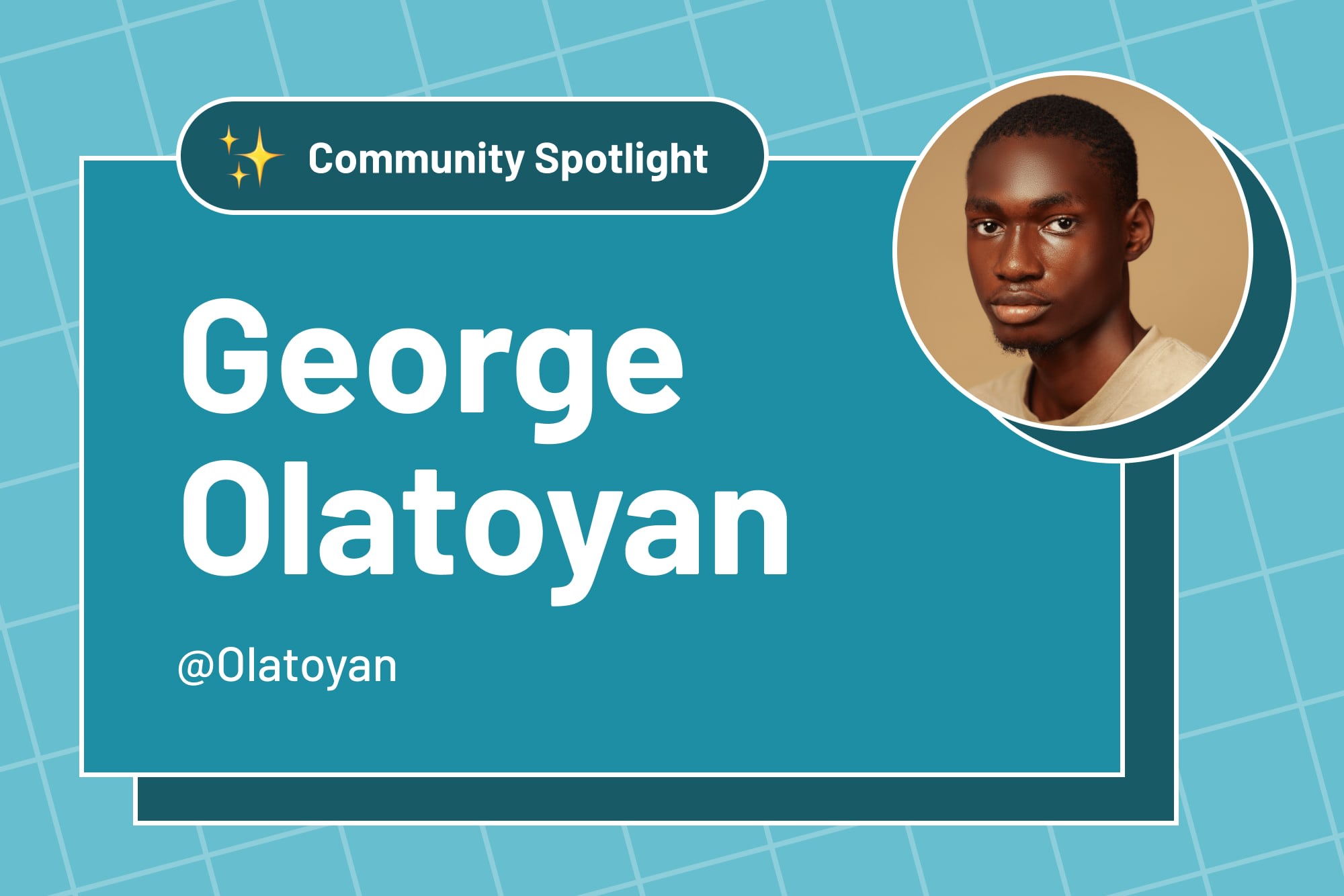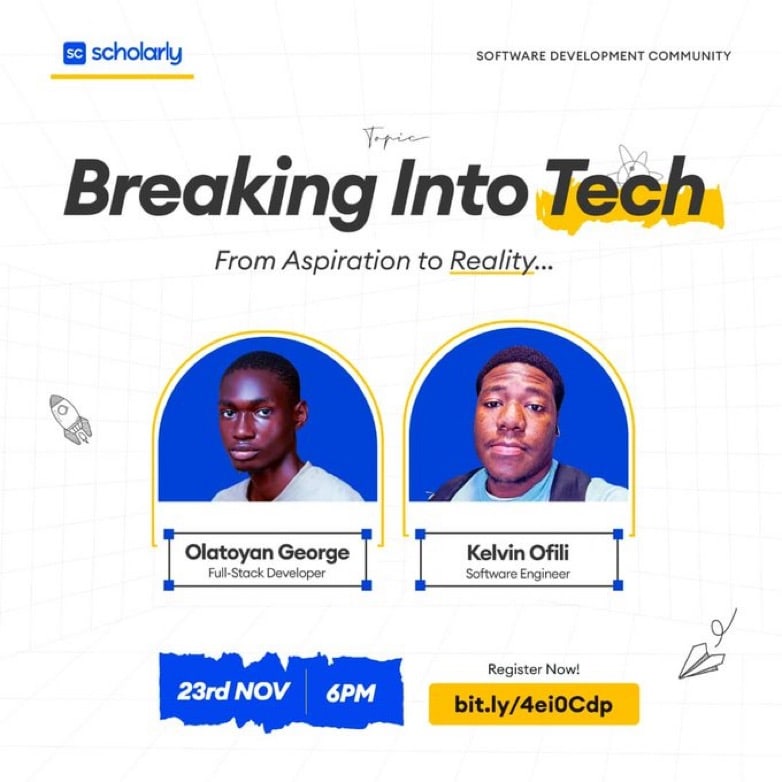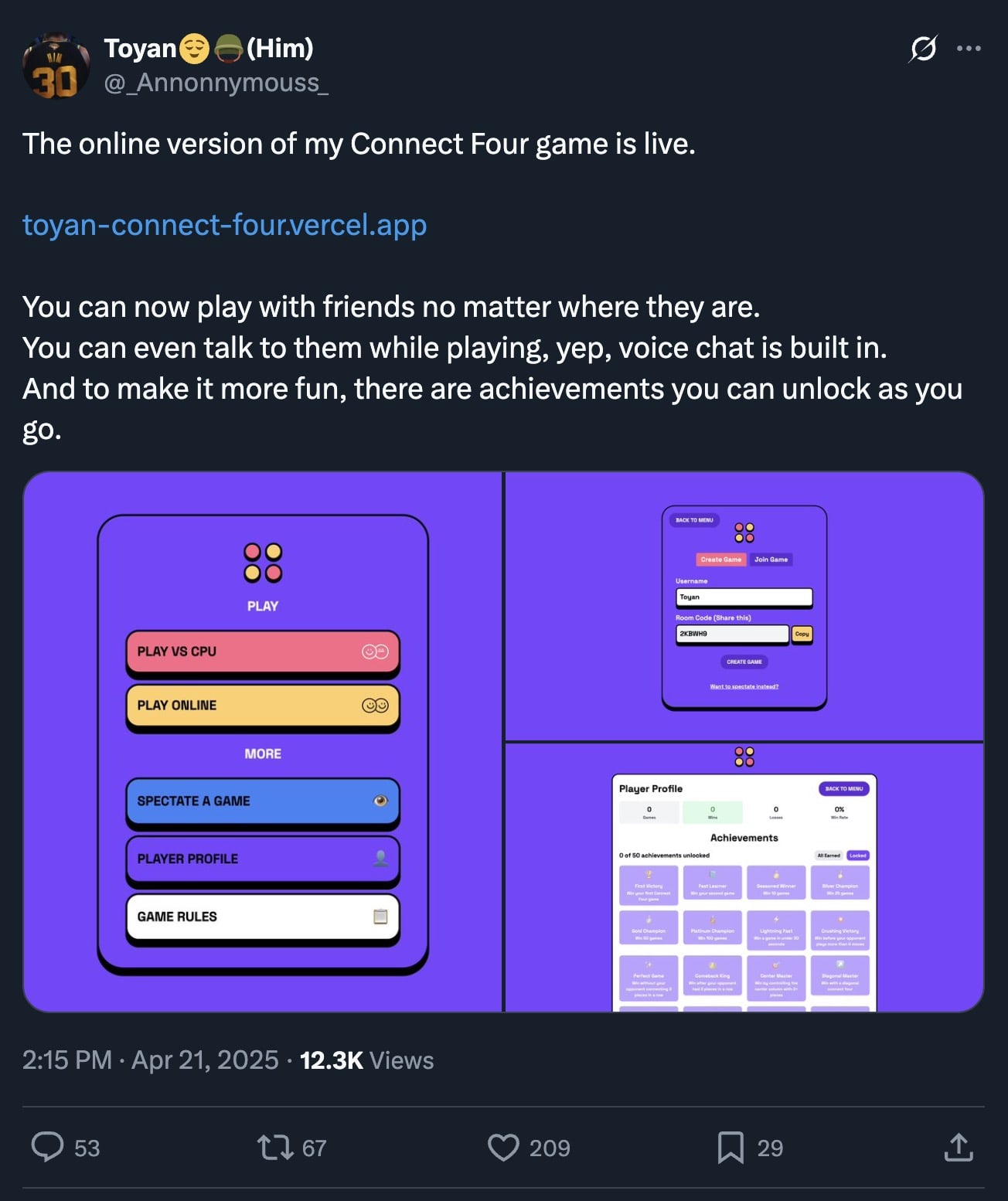
How learning in public has shaped Toyan's coding journey
In this community spotlight, Toyan shares how building projects and sharing his work have opened up opportunities.
Table of contents
We're excited to say that community spotlights are back! There are so many inspiring stories that we wanted to bring spotlights back to share the incredible journeys developers in our community have taken to get where they are today.
To kick off our spotlight articles again, we're delighted to share Toyan's journey from struggling to find a career path to discovering a passion for coding. Toyan has completed over 50 of our challenges and shares his journey regularly on X/Twitter. His progress from building simple components to complex, full-stack, multi-page web apps is truly inspiring.
Without further ado, it's over to Toyan...
Introduction
I didn't start coding because I loved it. I started because I wanted a way out. Out of the struggle.
Two years ago, I started a journey I didn't expect to enjoy. It all began when my roommate left Nigeria for the UK. Seeing his UK updates lit a fire in me. I needed a way out, too, and I started looking for options. One night, while scrolling through Instagram, thanks to the algorithm, I saw ads for apps offering thousands of free courses. That got me curious. I downloaded one and started researching what it would take to break into tech.
"If you're really good at what you do, people will chase you."
I won't lie. At first, I was in it for the money. But my cousin once said, "If you're really good at what you do, people will chase you." That stuck. I shifted my focus from quick cash to getting good because I knew the money would come. Somewhere along the line, I began to enjoy coding for what it was. I just wanted to keep getting better.
Where it began
After seeing those course ads, I found one on Udemy that promised to teach frontend and backend in 40 hours. I thought 40 hours was enough. I was wrong. I started with the basics. HTML & CSS, copying everything line by line, thinking I understood it. Nine days in, I reached the JavaScript section and proudly told my roommate how far I'd gone. He said I was rushing and asked me to build a simple, responsive form. He looked at me and said, "You're moving too fast. Can you build something on your own yet?".
I said, "Yeah, I think so."
Then he said, "Alright, build a simple form. Just name, email, and message. Make it responsive."
I opened my editor and stared at a blank screen. I didn't know where to start.
I forgot how to set up the basic HTML structure. Without copying someone, I couldn't remember how to style the layout, and I didn't know how to make it look decent on a small screen. I just sat there, stuck.
That was the moment it clicked, I wasn't learning, I was just watching tutorials.
I wasn't building anything, I was following along and assuming I understood.
That was a wake-up call.
So I stopped rushing, did proper research, and read tons of reviews until I found a highly rated instructor: Jonas Schmedtmann. I took three of his courses: HTML & CSS, SASS, and JavaScript.
From day one, I started taking organized notes, not random jottings, but proper summaries I could return to and understand.
Once I finished the HTML & CSS course, I browsed Dribbble for components and tried building things like accordions and forms. That's when it clicked. This wasn't just a chore anymore; it was fun.
Then I started the JavaScript course, and everything changed. I was spending most of my time at my desk. I stopped playing Call of Duty Mobile. I just wanted to learn more. It was tough, but being able to build actual things kept me going.
Soon, I was writing my own code examples in my notebook, not just copying code but rewriting it in a way I could explain it to myself.
While still taking the course, I wanted to test my skills. I found CodeWars, but the challenges were too advanced at that stage. So I searched for real-world projects, and that's when I discovered Frontend Mentor. I took on my first project. It looked basic, but I built it anyway.
That's also when I began posting my work online. Sharing my progress helped me connect with other devs, get feedback, and stay motivated.
What helped me stay on track
I didn't face many major roadblocks, mainly because I had someone to guide me. After every project, I sent it to my friend for review. He always pointed out areas for improvement.
But beyond that, sharing my work online made a huge difference. Your code may work, but that doesn't mean it's good. Some people make the mistake of working in isolation. Don't do that. Feedback is fuel.
Also, I avoided the trap of comparing myself to others. Everyone has their own pace and circumstances. I focused on getting better than I was yesterday, not on how far someone else had progressed.
My proudest moments
One of my proudest moments was being invited to speak at an online event. I was told they found me online and appreciated my consistency and drive.

I spoke about how I got into tech, how I stayed on track without burning out, and the habits that helped me stay consistent. I was nervous, but it went well, and seeing people engage in the chat made it feel real.
Another highlight is when people message me saying I inspire them. Just knowing I've helped someone stay on their path means a lot.
And then, there was a time I posted one of my projects on LinkedIn. A few days later, someone messaged me. They liked how clean the UI looked and asked if I could help build their website. I said yes. It was a waitlist landing page. I handled both the frontend and backend, built the form, connected it to a database, and made sure it worked well on all devices. A few days after launch, the client messaged me again; they had already gotten a couple of signups. That was my first paid project, and it felt good to know my work had a real impact.
My advice for beginners
Don't expect to learn everything in six months and land a job immediately. Take your time, learn the fundamentals, and master your tools. The market is competitive.
Also, put your work out there. Someone once said, "It's not just the best developers getting hired, it's the ones who are visible." Visibility doesn't replace skill, but it gives you a fighting chance.
When I started posting my progress on X/Twitter, I didn't have an audience. I just wanted to document what I was building. But over time, people began replying, liking, and giving small bits of feedback. It helped, so I kept going.

One of my recent projects was an online Connect Four game (a Frontend Mentor challenge) with AI and multiplayer support. I posted about the game on X/Twitter, and a bunch of people tried it out and told me what they thought. Some pointed out bugs, others just said it was fun. That kind of response made me realise that sharing your work doesn't just show progress, it gets you noticed.
The client who reached out to me? It happened because they saw my work and liked it. Simple.
Take notes. Don't rely on memory. Forgetting is normal, but writing things down saves you in the long run.
Research properly, and ask questions. Use Google. AI is helpful, but don't depend on it to think for you. Use it to break down problems, not to avoid learning.
One time, I didn't understand how Array.prototype.map() worked. So, instead of asking for a complete solution, I asked ChatGPT to explain how .map() differs from .forEach() and what kind of values it returns. Then I created my own mini-examples using both to test the difference. That's what helped it stick.
Always make sure you can explain it back. If you can't, you haven't really learned it.
If you're looking for a solid course to start with, I recommend Jonas Schmedtmann's. His teaching style works. Also, use Frontend Mentor challenges for practice. They're real-world, and they build confidence.
Why community matters
Having a supportive group around you makes a real difference. Sometimes you need a little push. Seeing others make progress can inspire you to continue moving forward.
I created a WhatsApp group called Accountability Buddies. Every day, I ask members what they learned. We help each other fix bugs and stay consistent. Nobody knows it all, but together, we get better.
Honestly, the best way to learn something is to teach it to others. Explaining a concept forces you to truly understand it. Combine that with constant practice, and you'll grow faster than you think.
Was my first project good? No.
Was it clean? Not at all.
Did I make mistakes? Many.
But I'm glad I pushed through. I found Frontend Mentor at the right time. The projects shaped my growth. I've improved a lot since the first one, and I'm still learning daily.
What's next for me
I've just updated my portfolio, and I'm actively looking for a frontend role. But this isn't just about landing a job; I'm looking for a team where I can ship real products, grow alongside more experienced developers, and challenge myself to continually push the boundaries. I want to contribute to meaningful projects and create impactful solutions that users love.
I'm also working on a web app that tracks subscription payments, something that's been on my mind for a while now. It's an exciting challenge combining everything I've learned so far: front-end development, design, and some back-end logic. I'm creating a tool that helps others stay organized and manage their finances more effectively. It's still a work in progress, but I'm excited to see it grow.
But beyond just coding, I'm learning how to think critically about problems, refine my design process, and understand the full scope of building a product, from the user experience to the backend architecture. The journey doesn't end at just writing code; it's about creating things that solve real problems and make a difference.
If you're new to coding, here's what I'll leave you with:
- You're not behind. Everyone's timeline is different.
- You're not alone. We're all learning, and the dev community is full of people ready to help.
- It's okay to feel stuck. I've been there. Everyone has their struggles. But the key is to embrace the process and trust it.
Just don't stop learning. Continue to explore, experiment, and grow. The journey might be long, but it's worth it. And remember, every small step forward counts.
Take your skills to the next level
- AI-powered solution reviews
- 50+ portfolio-ready premium projects
- Professional Figma design files